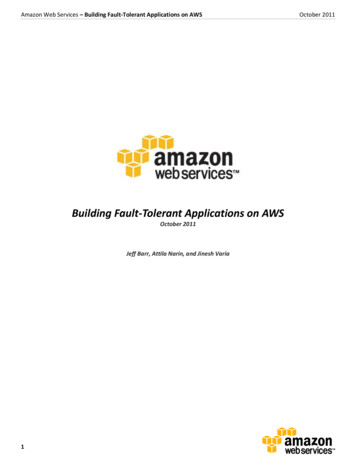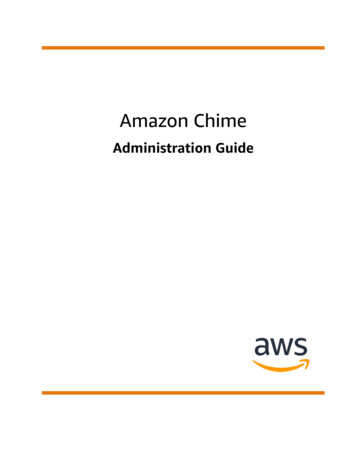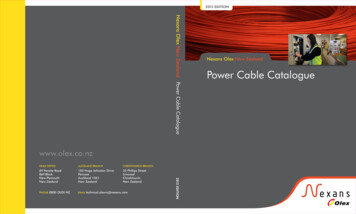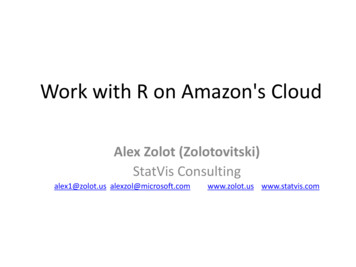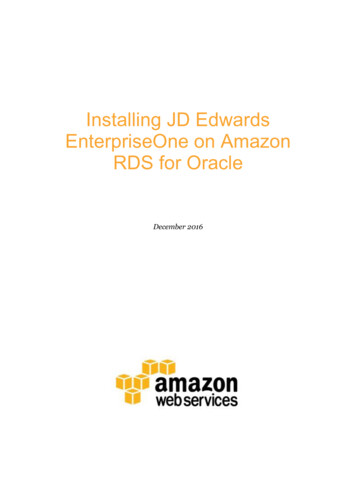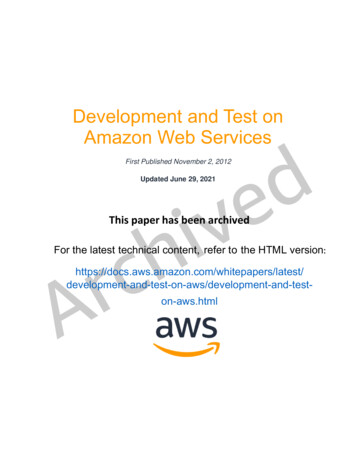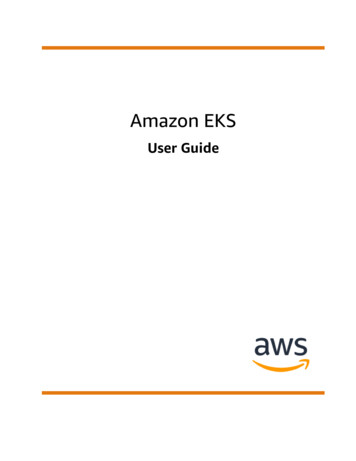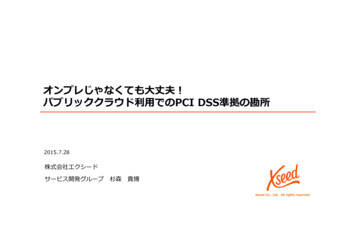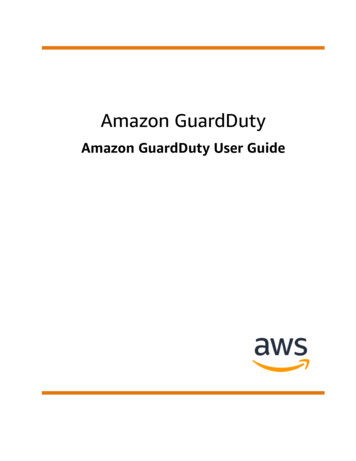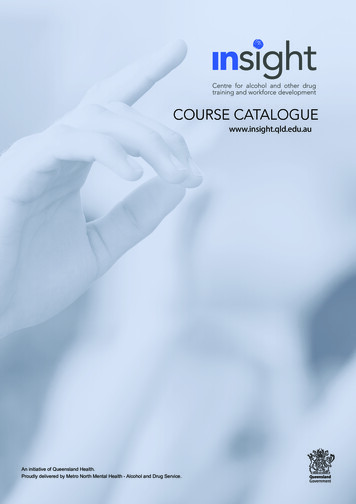
Transcription
COURSE CATALOGUEwww.insight.qld.edu.auAn initiative of Queensland Health.Proudly delivered by Metro North Mental Health - Alcohol and Drug Service.1
Insight: Centre for Alcohol and other Drugs Training and Workforce DevelopmentCourse CataloguePublished by the State of Queensland (Metro North Hospital and Health Service), April 2020This document is licensed under a Creative Commons Attribution 3.0 Australia license. To view a copy of this license, visitcreativecommons.org/licenses/by/3.0/au State of Queensland (Metro North Hospital and Health Service) 2020You are free to copy, communicate and adapt the work, as long as you attribute theState of Queensland (Metro North Hospital and Health Service).For more information contact:InsightMetro North Mental Health – Alcohol and Drug Service,270 Roma Street Brisbane 4000.Email: insight@health.qld.gov.auPhone 61 (07) 3837 5655.An electronic version of this document is available at www.insight.qld.edu.auDisclaimerThe content presented in this publication is distributed by the Queensland Government as an information source only.The State of Queensland makes no statements, representations or warranties about the accuracy, completeness or reliability ofany information contained in this publication. The State of Queensland disclaims all responsibility and all liability (including withoutlimitation for liability in negligence) for all expenses, losses, damages and costs you might incur as a result of the information beinginaccurate or incomplete in any way, and for any reason reliance was placed on such information.
INDEX45678Workshop InformationOur TrainersInsight – APSAD Seminar/Webinar SeriesInsight ToolkitseLearning99One Day Introductory WorkshopsAOD Crash CourseYoung People and Drugs (Dovetail)Core Basics10 Understanding Psychoactive Drugs10 Assessing and Managing WithdrawalCore Practice 111 Micro-counselling and Brief Intervention Skills11 Motivational InterviewingCore Practice 212 AOD Harm Reduction12 Relapse Prevention and RecoveryBest Practice13 Culturally Secure AOD Practice - Featuring IRIS13 Family Inclusive Practice13 Trauma Informed Care1414141515ElectivesSensory Approaches for AOD PracticeClinical Case Formulation SkillsCrystal Clear: Responding to Methamphetamine UseAn Introduction to Mindfulness in AODResponding to Inhalants16 Fee Schedule
WORKSHOP INFORMATIONInsight are specialist providers of alcohol and other drug training, education, information and practice advice forworkers and services. We provide progressive learning opportunities ranging from introductory level through tospecialised discipline-specific professional development courses. We are committed to providing best practice,evidence-based clinical training and support for the state’s alcohol and drug workforce.Workshop BookingsAll bookings are managed online through our “Training” page at www.insight.qld.edu.au. Bookings are essential.Participants must wait to receive a booking confirmation notice before they can be assured of their successfulregistration. Early registration is recommended as workshop places are limited. Set places are allocated toQueensland Health and non-Queensland Health employees for most workshops. Restrictions apply on the number ofregistrations accepted from a single organisation for each event, managed on a case-by-case basis. If events are oversubscribed, Queensland based workers from specialist alcohol and drug services will be given priority places followedby mental health, hospital, community health and other frontline support workers.Waiting listsOur online booking system features an automated waiting list service for most training events. If an event you wish toattend is sold out and no waiting list option appears, please express your interest by emailinginsight@health.qld.gov.auFees for trainingThere is no charge to attend our training events for either Queensland Health or non-government employees unlessspecified.CPD points and CertificatesParticipants attending Insight workshops are able to gain CPD hours. See individual core skills training workshop forPD endorsement and visit the AHPRA website: www.ahpra.gov.au for further information. All participants attendingInsight workshops will receive certificates to acknowledge their attendance. Participants attending core skillsworkshops will be required to meet core skills requirements to obtain a certificate of course completion.Please note: Full attendance at the workshop is required to receive a certificate of attendance/completion.Venues and cateringInsight’s primary training venue is the Edwards Miller Training Room, 4th Floor Biala, 270 Roma Street, Brisbane. Tea,coffee and a light lunch are provided at all full-day workshops held at Biala. Catering is not provided at other venuesunless specified.ParkingThere is no parking available at Biala. Limited, metered street parking is available in surrounding streets. The closestpaid parking can be found at the Barracks Shopping Centre on Petrie Terrace which is a short, 5 minute walk to ourbuilding. Roma Street Station is our nearest public transport hub which is also a 5 minute walk away.AccessibilityThe Biala Building is wheelchair accessible. Interpreters, captioning services and other sensory impairment aids can beorganised if required. Please contact us at least 2 weeks prior to your workshop to discuss.Cancellation policyApplicants will be notified by email and/or phone if courses are cancelled. If you are unable to attend a workshop,please notify us as soon as possible so that your space can be offered to someone on our waiting list.NB: For health and safety reasons it is our policy to email both you and your line manager in the event that you do notattend a workshop without prior cancellation.Contact Details and EnquiriesFor information on any of the services offered by Insight or to place your name on our mailing list please visitwww.insight.qld.edu.au, phone: (07) 3837 5655, or email: insight@health.qld.gov.auWe look forward to seeing you at one of our events!4
OUR TRAINERSJeff Buckley - DirectorJeff is a Social Worker with 15 years’ experience across government and non-government settings in alcohol anddrug practice, youth homelessness, community development and adult education. Jeff has also worked in servicemanagement, private consulting and University teaching roles.Samantha Clark - Nurse EducatorSamantha is a Mental Health Nurse with over 20 years’ experience in mental health and alcohol and drug servicedelivery, policy and program management. She has a particular interest in dual diagnosis, Cognitive-BehaviouralIntegrated Treatment (C-BIT) and working with vulnerable populations.Margaret Ness - Advanced Clinical Education CoordinatorMargaret has over 20 years’ experience in the alcohol and drug field, working across government and nongovernment sectors. As a Psychologist and a registered nurse, Margaret’s career has included roles in AOD research,clinical counselling, education and workforce development.Michelle Taylor - Advanced Clinical EducatorMichelle is an Occupational Therapist with over 25 years’ experience supporting clients, families and workers inthe areas of alcohol and drugs and mental health. She has a keen interest in sensory approaches, occupationalapproaches, trauma informed care, family inclusive practice, and creative writing.Peggy Manton-Williams- Aboriginal & Torres Strait Islander Workforce Coordinator- AODPeggy has worked in Queensland Health for over 25 years, belonging to the Kamilaroi Clan group from NorthernNSW. She has worked in a variety of roles from Health Worker to Team Leader with experience in AOD Prevention andPractice, Nursing and management. She has a Bachelor in Indigenous Primary Health Care and Grad Certs in HealthPromotion and Public Health - AOD.Jim Hunt - Nurse EducatorSince finding his passion as a Mental Health Nurse 20 years ago, Jim has worked across a variety of inpatient,community and forensic settings. He has a passion for supporting people with alcohol and drug issues in a way thatpromotes engagement and reduces stigma.Cameron Francis - Principal Consultant, DovetailCameron is a Social Worker who has worked in various roles across non-government and government agencies,including outreach, peer education, NSP and as an individual counsellor for young people. In his current role withDovetail, Cameron provides support and assistance to front line youth AOD services throughout Queensland.Bec Mounsey - Social Worker - DovetailBec completed her Social Work degree in 2013. She has since supported both young people and adults in her rolesas youth worker, family case manager, group work facilitator and alcohol and other drugs counsellor in the not-forprofit sector. Bec now provides AOD support and assistance to front line workers in the youth sector with her role atDovetail.Dan Phillips - Advanced Clinical EducatorDan is a Psychologist with over 25 years’ experience in the alcohol and drug sector. He has worked in corrections,rehabs and in the community, gaining experience in group facilitation, counselling and case management.Anita Myers - Nurse EducatorAnita is a Registered Nurse with 13 years’ experience and a Master of Public Health. She has translated herexperience in emergency nursing across to drug and alcohol sector. She is passionate about reducing stigma andproviding an evidence-based biopsychosocial care to all clients and their families.Sonia Boyd - Snr Social Worker - Family Response AOD PracticeSonia Boyd is a Social Worker with a background in alcohol and drug practice, project management, remote areawork and service commissioning. She also has a Master in International and Community Development - which isa marvellous combo for building family responsive AOD practice across Queensland under the ‘Breakthrough forFamilies QLD’ Project.5
HUB ‘N’ SPOKE SITE TRAINERSJennifer Brazier - Nurse Educator (Cairns)Jennifer is a Nurse Educator at Cairns Community, Mental Health and ATODS. She has many years’ experienceworking clinically as a registered nurse and for the past 12 years has worked as a Nurse Educator. Jennifer currentlydelivers AOD training courses across North Queensland.Kerry Mollenhagen – Nurse Educator (Townsville)Kerry is a Credentialed Mental Health Nurse with over 34 years’ experience in mental health and alcohol and drugservice delivery in both private and public health services.INSIGHT - APSAD SEMINAR / WEBINAR SERIESInsight hosts a free seminar series each semester at Biala in partnership with the Australasian Professional Society onAlcohol and other Drugs (APSAD).Seminars are held each Wednesday morning starting at 10:00am AEST (Queensland time) in the Edwards MillerTraining Room, 4th floor, Biala. There are 13 seminars each semester and each presentation lasts for one hour.You are welcome to attend our seminars in person or via webinar.To join the webinar from your computer, in your web browser go to www.insight.qld.edu.au/webinars/Most seminars are recorded and made available through the Insight website within 2 weeks. To view previousrecordings please visit https://insight.qld.edu.au/training/webinars/past We also invite you to be a contributor tofuture seminar programs. Please contact us to discuss your topic or idea.6
INSIGHT TOOLKITSThe Insight website features a range of tools, templates and resources to assist you in direct practice.AOD Client EngagementThis toolkit contains e-learning packages, templates, tools and other resources that AOD services can use to buildpartnerships with clients that improve the safety and quality of their treatment and care.Brief InterventionsThis toolkit contains Insight’s “Check” series of Ultra Brief Interventions, common AOD screening and assessmenttools and other resources that can help guide a clinician to conduct a brief intervention.Dual DiagnosisThis toolkit contains a series of resources, videos and eLearning for workers who wish to develop their practice withclients who have co-occurring substance use and mental health problems.eLAMP - eLearning in AOD for Medical PractitionerseLAMP contains the “Managing Substance Dependence and Withdrawal” eLearning packages funded by thePrevention Division within the Queensland State Government’s Department of Health under the Medical PractitionerWorkforce Plan for Queensland (MPWP4Q).First Nations AOD ToolkitInsight delivers a range of training and cultural capacity building activities for Aboriginal and Torres Strait Islandersand non-Indigenous practitioners across Queensland.GP Webinar Evenings SeriesA series of 1-hour webinars presented on the 1st Wednesday of the month 6:00 - 7:00pm (AEST) August toNovember 2018.Meth CheckMeth Check is a package of free tools, factsheets, flowcharts, e-learning and video resources designed forQueensland-based health and community service workers who engage with people who use methamphetamine.Opioid CheckOpioid Check is a package of free tools, e-learning, videos and other resources designed for Queensland-basedhealth and community service workers who engage with people who use opioids.Pregnancy and Substance UseThe Pregnancy and Substance Use toolkit is a package of free links, guidelines and resources designed for healthworkers who engage with pregnant women who use substances and their families.QLD Needle and Syringe ProgramThis Needle and Syringe Program Training is an educational resource presenting concepts, knowledge and skillsrequired to work effectively as a Needle and Syringe Program (NSP) worker in Queensland. This toolkit is designedfor use by Primary NSP staff and experienced NSP workers.The Queensland Opioid Treatment Program (QOTP) Prescriber CourseWelcome to the Queensland Opioid Treatment Program (QOTP) Prescriber Course. This is a self-paced module forGPs, Medical Practitioners and Nurse Practitioners seeking to become authorised to prescribe opioid treatment inQueensland. There are two ways to access this training. Follow the relevant instructions from the options provided.Withdrawal ManagementClinical tools, guidelines and resources to assist withdrawal management with clients and patients.Working with FamiliesThe Working with Families toolkit is a package of free tools, e-learning, videos and other resources designed forQueensland-based health and community service workers who engage with families.Young People and Drugs (Dovetail)Dovetail provides clinical advice and professional support to workers, services and communities across Queenslandwho engage with young people affected by alcohol and other drug use.7
ELEARNINGA Certificate of Completion will be given following successful completion of short multiple choice exams found at theend of each module. All modules are self-paced and your progress will be saved as you go.To access these modules, please visit: standing DrugsInsight has developed a range of eLearning to give participants a basic overview of the below substances includingforms, history and rates of use and explore some ideas around why people use these substances, how they are used,their effects and how to respond to an overdose. You will also learn about substance dependence, what treatmentoptions are available and where to go for more information and support. Understanding Alcohol Understanding Cannabis Understanding Opioids Understanding Methamphetamine Understanding Benzodiazepines Understanding CocaineAOD Induction ModulesInsight has developed a series of online induction modules covering introductory content relevant for all professionaldisciplines in the AOD field: Foundational Alcohol and Other Drug Concepts Orientation to the AOD Treatment System Screening and Brief Intervention AOD Assessment Relapse Prevention and ManagementAOD Elective Modules Orientation to Telephone Counselling for Alcohol and Other Drug Workers AOD Client Engagement Working with Families and Significant Others (Dovetail) An Introduction to Youth Alcohol and Other Drugs (Dovetail) Queensland Needle and Syringe Program TrainingThe Queensland Opioid Treatment Program (QOTP) Prescriber CourseTwo self-paced modules are available for GPs and other Medical / Nurse Practitioners who are seeking to becomeauthorised to prescribe opioid treatment in Queensland or to extend their existing authorisation to include LongActing Injection Buprenorphine.eLAMP: eLearning in AOD for Medical PractitionerseLAMP contains a series of dedicated medical practitioner eLearning modules targeting GPs, Trainees, Junior Doctorsand Nurse Practitioners - or as a refresher for existing Addiction Specialists - on how to best manage substancedependence and withdrawal with patients.The Insight website also features links to a range of other external eLearning courses recommended for practitioners.8
Which training should I attend?If you are a generalist worker and AOD is only a part of your role - or your availability to attend training is limited –we recommend you complete either the 1-day ‘AOD Crash Course’ or ‘Young People and Drugs’ workshop. If youare employed directly within the AOD and/or mental health fields, we recommend that you complete all Core SkillsWorkshops.If you have any questions about which workshops to attend, please contact us on (07) 3837 5655 or insight@health.qld.gov.auONE DAY INTRODUCTORY WORKSHOPSAOD Crash CourseFull dayMax 30 Participants1 EducatorNB: This course features content highlights from all of Insight’s Core Skills Workshops, particularly “UnderstandingPsychoactive Drugs”. It is not recommended if you are planning on completing the full suite of Core SkillsWorkshops. There is also some duplication with content contained within Dovetail’s Young People and Drugs(YPaD).This one-day workshop is designed for new and/or non-specialist workers who want to develop a broadunderstanding of psychoactive drugs and a basic knowledge and skillset in how to support someone who may beexperiencing problematic substance use.Topics covered include: history of substance use, statistics, prevalence and rates of use key substance types, effects and patterns of use understanding harm and substance dependence values, language, stigma and discrimination the Transtheoretical Model (Stages of Change) aims and objectives of AOD treatment basic assessment and brief intervention basic harm reduction and managing intoxication where to go for more information, training and supportYoung People and Drugs (Dovetail)Full dayMax 30 Participants1 or 2 EducatorsNB: There is also some duplication with content contained within AOD Crash Course.This full-day workshop targets practitioners who work directly with young people aged 12 - 25 years in a one-on-onecapacity including youth workers, alcohol and drug workers / clinicians, child safety officers, youth justice officers,residential support workers, youth support coordinators, school-based youth health nurses, Indigenous healthworkers, mental health professionals, guidance officers and employment and vocational staff.The training provides an overview of youth alcohol and other drug (AOD) use including: a framework for Youth AOD Practice history, context and background to AOD policy in Australia stats, figures and current trends in youth AOD use risk vs protective factors engagement and assessment the Transtheoretical Model (Stages of Change) motivational interviewing brief intervention practical hints, tips and tricks for working with young people with AOD issues9
CORE BASICSUnderstanding Psychoactive DrugsFull dayMax 30 Participants1 EducatorNB: This course is a pre-requisite for both “Assessing and Managing Withdrawal” and “AOD Harm Reduction”workshops.This workshop covers foundational knowledge and concepts required to work in the alcohol and other drug field.Topics covered include: history of substance use, statistics, prevalence and rates of use moral, legal, disease and bio-psychosocial models of substance use Australian drug policy frameworks and guidelines basic neurobiology and pharmacology routes of administration patterns of use and harms from substance use intoxication and overdose Tolerance, dependence and withdrawal foundational therapeutic concepts including the Transtheoretical Model (Stages of Changes) overview of the Queensland AOD Treatment System the evidence-base underpinning therapeutic interventionsAssessing and Managing WithdrawalFull dayMax 30 Participants2 EducatorsNB: This training is recommended for all practitioners and is highly recommended for Nurses who are working inAOD treatment and mental health services.The aim of the course is to develop basic knowledge and skills in the assessment and management of withdrawal forpeople who are dependent on alcohol and other drugs as outlined in the Queensland Alcohol and Drug WithdrawalClinical Practice Guidelines.Topics include: history of substance use, statistics, prevalence and rates of usefoundational AOD theories and conceptsunderstanding dependence, tolerance and withdrawalrationale and principles underpinning withdrawal managementpatient presentations for withdrawal managementassessment for withdrawal managementdrug-specific withdrawal symptoms, including the withdrawal process and expected durationThis workshop is also now available as a 6-part Zoom virtual classroom workshop to make our content more accessibleand allowing participants greater opportunity to practice and receive feedback. The full day workshop has beenbroken down into 1.5-hour modules focusing on a different substance and delivered via Zoom over multiple days. Themodules are broken down into the below topics: abisNeurology and NeurotransmittersPlease Note: This workshop is a prerequisite for the 2-day Advanced Withdrawal Course for NursesParticipants must hold current nursing registration with AHPRA.
CORE PRACTICE 1Micro-counselling and Brief Intervention SkillsFull dayMax 30 Participants1 EducatorThis workshop uses a mix of case-studies, live-practice scenarios and video examples to explore the range ofcounselling techniques and skillsets required to form and maintain a therapeutic relationship with clients, conductscreening and brief interventions and have difficult conversations with clients and family members.Topics covered in this workshop will include: active listening skills, including verbal and non-verbal communication recognising and overcoming barriers to effective communication conducting screening and brief interventions using FRAMES and brief motivational interviewing techniques managing challenging behaviours by utilising de-escalation and refusal skills responding to common counselling dilemmas and client curveballsMotivational Interviewing4 x Half dayMax 12 Participants1 EducatorNEWPrerequisite: Online Induction Material – Module 5The Motivational Interviewing training is now broken into a 4-part modular option, with each session focusing ona specific M.I. skill or topic. These are half day workshops that also have a follow-up group Zoom videoconferencewhich is scheduled in the fortnight after each session so that participants can seek additional feedback after applyingtheir new M.I. skills in direct practice.It is recommended that participants complete each session in order, particularly for those workers who are new tocounselling and M.I.MI 1: The Spirit of MI and the Core SkillsAn understanding of the spirit is essential and will guide further learning and your practice. The first session willcover the underlying spirit of MI, along with the core skills. The core skills are shared with other forms of counsellingand they are used across the four processes of MI.MI 2: Change TalkThe focus of the second session will be on change talk, with time spent on the different subtypes of change talk. Theaim is to help you better recognise and respond to change talk when it is evoked from your clients.MI 3: Evoking Change TalkThis session will focus on how to evoke change talk, the heart of MI. It will also demonstrate how to use the core skillsto respond to sustain talk and what to do if there is discord.MI 4: Planning and Consolidating CommitmentThere are four processes of MI and this session looks at how to recognise which stage your client may be at to informyour approach, including the final process of developing a change plan and then consolidating commitment.11
CORE PRACTICE 2AOD Harm ReductionFull dayMax 30 Participants2 EducatorsNB: This training is targeted towards workers employed within specialist AOD treatment and mental healthservices only. It is not suitable for generalist health and community workers, statutory officers or members of thegeneral public.This course is designed to equip frontline health and community service practitioners with up-to-date information onsuitable harm reduction strategies that can be utilised by clients attending AOD treatment services. The workshop willalso include tips on how to provide good quality harm reduction advice to people who inject drugs.Topics covered include: AOD use principles underpinning ethical harm reduction harm reduction strategies for a number of different drugs AOD Clients report using blood borne viruses full overview of safe injecting practicesParticipants will also be provided with an overview of the types of injecting equipment available at primary NSPs andwitness a practical demonstration of safe injecting with a prosthetic device.Relapse Prevention and RecoveryFull dayMax 30 Participants1 EducatorPrerequisite: Online Induction Material – Module 6This workshop will equip workers with practical and positive strategies to assist clients who experience difficultymaintaining their drug use goals including preventing and managing relapse.Topics covered include: precursors of relapse the Resolution Breakdown model identifying high risk situations for substance use relapse prevention and management interventions practical skill development exercises.12
BEST PRACTICECulturally Secure AOD Practice – Featuring IRISFull dayMax 30 Participants1 or 2 EducatorsThis updated 1-day workshop aims to build cultural capacity when working with Aboriginal and/or Torres StraitIslander people who use substances. Designed for both Indigenous and non-Indigenous workers alike, the coursepromotes a culturally-secure AOD framework and approach to direct practice.Participants will learn how to use the Indigenous Risk Impact Screen (IRIS) and associated brief intervention toolsalongside other practical tips, tricks, tools and resources for use in everyday practice.Family Inclusive PracticeFull dayMax 30 Participants1 or 2 EducatorsThis one day workshop will explore a broad range of family inclusive approaches, strategies and tools that can assistin improving the effectiveness of alcohol and drug treatment, including addressing some of the specific barriers toimplementing family-inclusive approaches in practice.Topics covered include: understanding the impact of substance use on families including families in intake and assessment explaining and managing confidentiality genograms and timeline approaches supporting families through treatment tips for family self-care.Trauma Informed CareFull dayMax 30 Participants2 EducatorsInsight and Dovetail collaborate to bring you an interactive workshop on Trauma Informed Care (TIC) for AODPractice. The workshop is targeted towards alcohol and other drug workers who wish to develop their understandingand application of trauma informed care.Topics covered include: understanding trauma including its basis in neuroscience TIC and substance use: making the links vicarious trauma: self-care and use of self responding to client needs and building a toolkitNEWNB: This workshop requires workers to have a foundational level of knowledge of AOD practice; the workshop isdesigned to complement and enhance your existing AOD practice. If you are new to the area of AOD practice, itis recommended that you have completed the AOD Crash Course (Insight) or Young People and Drugs (Dovetail)training at minimum before attending this course.13
ELECTIVESSensory Approaches for AOD PracticeFull dayMax 30 Participants1 EducatorSensory Approaches is a collective term for a range of interventions that focus on supporting the client to achieveregulation of affect, attention and behaviour through regulation of bodily arousal states using a range of sensorymodalities. It is widely used in mental health services as a trauma informed approach, and as a first line intervention tomanage difficult emotional states.This workshop will provide participants with an understanding of sensory approaches, their application for peopleexperiencing problematic substance use, and tools to assist people to self-regulate.Clinical Case Formulation SkillsFull dayMax 30 Participants1 EducatorThe aim of this workshop is to assist clinicians from all disciplines to improve their clinical case formulation skills. Itwill provide an understanding of what constitutes case formulation, its distinction from diagnosis, and an overviewof developing case formulation within a functional analysis framework. Clinical reasoning ‘traps’ that can influenceassessment and formulation will also be discussed.This workshop will be interactive and involve the application of skills in designing clearly written and logicalexplanations of how a case is understood. The workshop will also focus on how to organise contradictory informationabout a person in case formulation and improve treatment planning.Crystal Clear: Responding to Methamphetamine UseHalf dayMax 30 Participants1 EducatorThis half day workshop is designed to assist frontline health and community service practitioners who work in AODtreatment or casework support roles to better understand and respond to the specific needs of clients who usemethamphetamine.Topics covered include: overview of methamphetami
Published by the State of Queensland (Metro North Hospital and Health Service), April 2020 . (Metro North Hospital and Health Service) 2020 You are free to copy, communicate and adapt the work, as long as you attribute the State of Queensland (Metro North Hospital and Health Service). For more information contact: . Bec completed her Social .
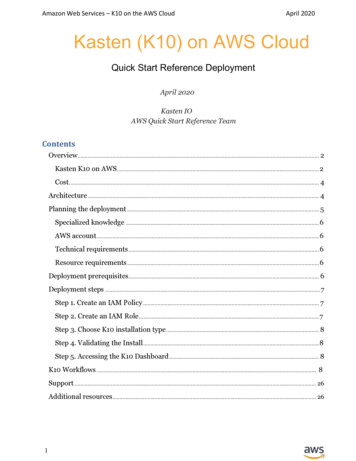
![Index [beckassets.blob.core.windows ]](/img/66/30639857-1119689333-14.jpg)
